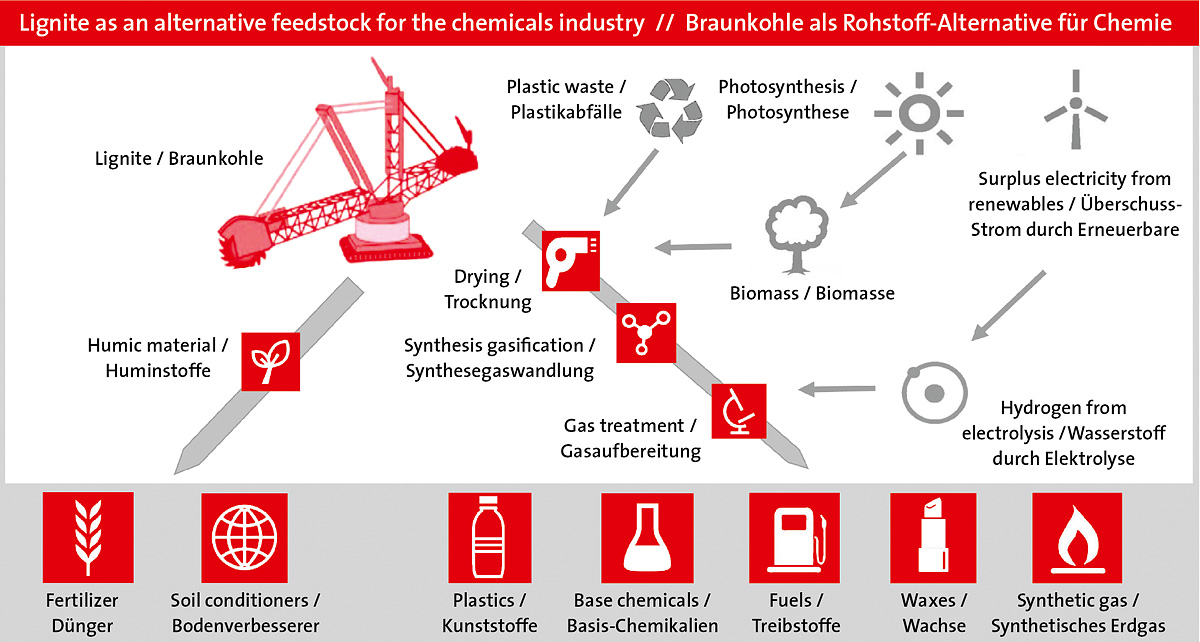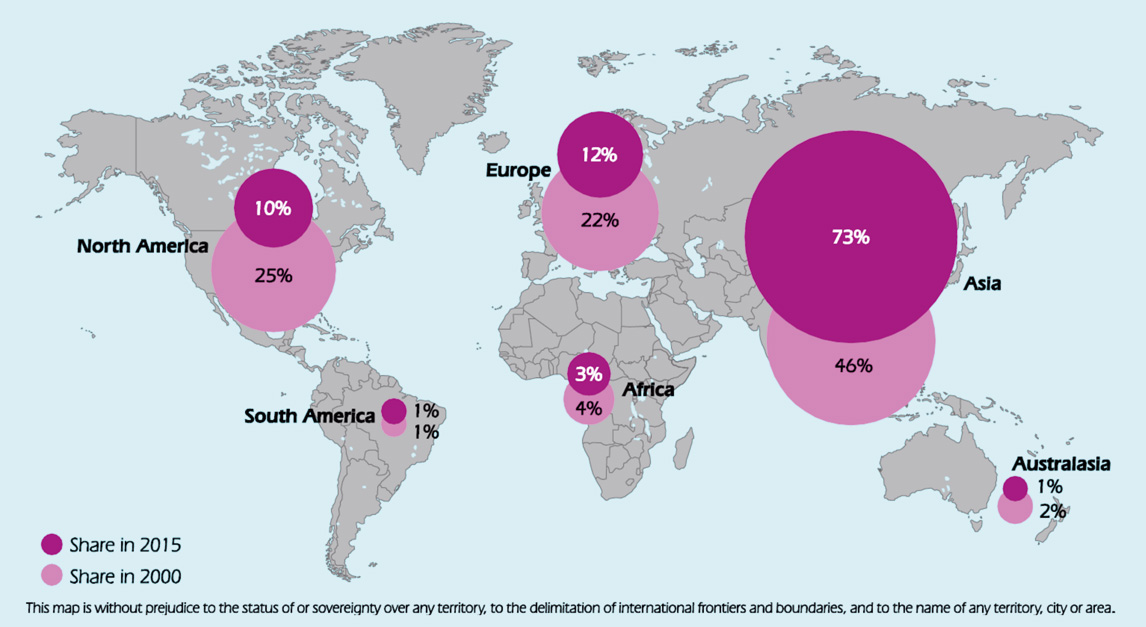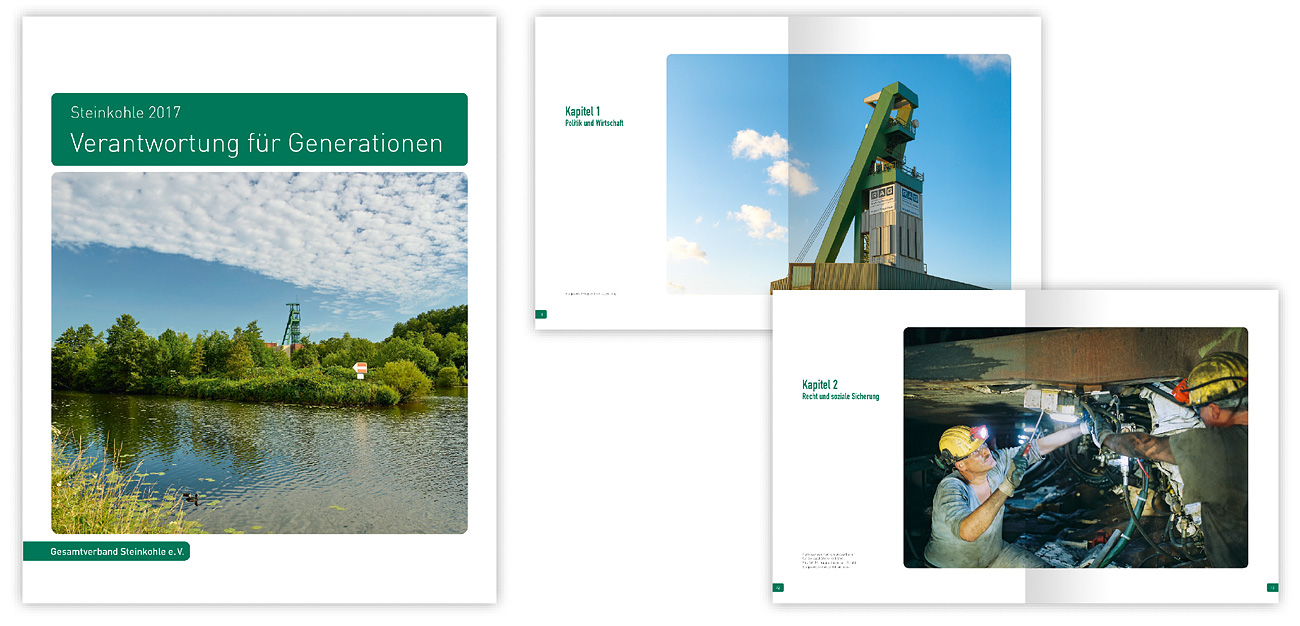As 2017 draws to a close I would like to put the spotlight on themes that rarely, if ever, feature in Mining Report Glückauf. One concerns the use of coal as a feedstock, instead of as a fuel for electricity production and steel making, and the other involves an assessment of the international coal market.
There are many in Germany who think that coal is “only” good for making steel and of course generating electricity and that in doing so it is damaging the climate and so should no longer have a future in the country. But they are overlooking the fact that this resource has other potential uses. Coal also can play a role in in the chemicals industry. The humic substances lignite e. g. contains can help improve barren soils. Coal also can be used …
Read moreWith my best regards // Mit freundlichem Glückauf
Dipl.-Ing. Andreas-Peter Sitte
Chief Editor Mining Report Glückauf, Essen
Coal to Chemistry. On the Material Utilisation of Lignite

Fig. 1. Lignite has potential as a chemical feedstock resource. // Bild 1. Braunkohle als Rohstoff-Alternative für die Chemie. Source/Quelle: van den Berg
Author: Guido van den Berg MdL, Mitglied des nordrhein-westfälischen Landtags, Düsseldorf
Read moreCase Study for the Construction of a 10-bpd-ALF-FT Plant for the Production of Sustainable Synthetic Kerosene for the German Aviation Industry Based on Different Carbon Sources
The authors have successfully completed several desktop studies for German and international coal producers over the past two years. The main focus of these studies was on the one hand on the presentation of the market environment for sustainable synthetic fuels and on the other hand on the explanation of the technical and technological process and plant concept of ALF-FT technology. The strategic goal is to provide proof of the basic technical and economic feasibility (proof of concept) of the production of sustainable “green” fuels for the German aviation industry. Initial model calculations show that this 10-bpd system can be operated under certain conditions with a positive economic result.
The authors are also currently involved in project developments aimed at using “green” hydrogen from alternative sources …
Authors: Dr. Rüdiger Schwarz, Dr. Craig Griffiths, Dr. Brendon Hausberger, Dr. Simon Holland, Axel Juch, Rebecca Reiche, ALF Advanced Liquid Fuel UG, Berlin
Read moreWorld Coal Market 2016/2017 and the Shifting Parameters of the Energy Transition

Fig. 6. Breakdown of coal consumption by continent for the years 2000 and 2015. // Bild 6. Anteil am Weltkohleverbrauch nach Kontinenten in den Jahren 2000 und 2015.
Author: Prof. Dr. Franz-Josef Wodopia, Geschäftsführer des Vereins der Kohlenimporteure e. V. (VDKi), Berlin
Read moreCoal 2017: Taking Responsibility for Generations
After a history stretching back more than 200 hundred years the German coal industry will close down for good at the end of 2018. The Essen-based RAG company is now committed to finding solutions for the inherited liabilities of the mining industry that will prove sustainable in the long term. Yet the transition to the post-mining era will not happen overnight. When production comes to an end in late 2018 the industry will enter a closure phase that will last from 2019 to 2021. During this period the last few collieries will be decommissioned and the remaining workforce will be downsized in a socially compatible manner. RAG will then continue to be responsible for post-mining operations from 2022 on. The company has already drawn up a sustainability strategy that sets out the methods it intends to use in tackling the legacy of the mining industry. This covers the three thematic focal points of post-mining operations, employees and business units, and cultural and social issues. The Annual Coal Report published by the German Coal Association (GVSt) in Essen, which this year bears the title “Taking responsibility for future generations”, presents the RAG sustainability strategy …Author: R. A. Michael Weberink, Hauptgeschäftsführer, Gesamtverband Steinkohle e. V., Essen
Read moreMining Does Not End with the Closure of Our Coal Mines: Network Mining – Smart Mining Global

Fig. 1. Members of the Mining Industry Network. // Bild 1. Mitgliederstruktur des Netzwerks Bergbauwirtschaft.
Authors: Dr. Eckehard Büscher und Peter von Hartlieb, Netzwerk Bergbauwirtschaft der EnergieAgentur.NRW, Düsseldorf
Read moreOutlook Turkey
Eight in ten of Germany’s mid-sized companies generate a significant part of their turnover abroad – and the same goes for many mining suppliers too. In spite of current uncertainties and geopolitical crises nearly one in every two small and medium-sized companies intends to maintain its overseas business strategy for the next three to five years and many are even planning to expand these operations. These were the findings from an SME study conducted by DZ Bank. In view of the protectionist economic policy announced by US President Donald Trump the Federation of German Industry (BDI), Berlin/Germany, has advised German companies to look increasingly towards Asian markets, thereby confirming the views of the Network Mining Group of the EnergieAgentur.NRW in Dusseldorf/Germany and many association experts. As a result, attention is shifting increasingly to countries on the Balkan peninsula, the Black Sea region, the Caucasus, Central Asia …Author: Peter von Hartlieb, EnergieAgentur.NRW, Düsseldorf
Read more


























